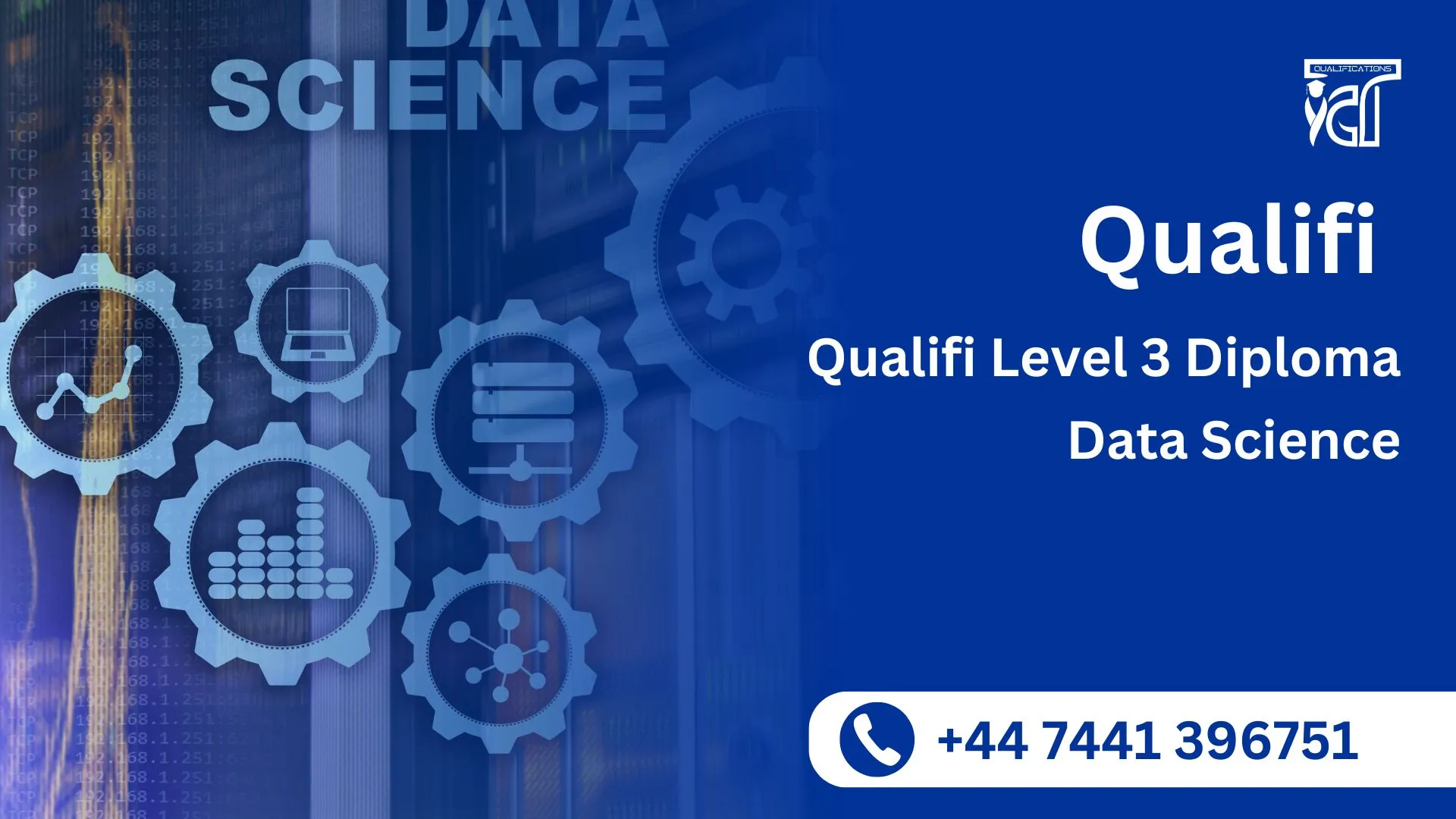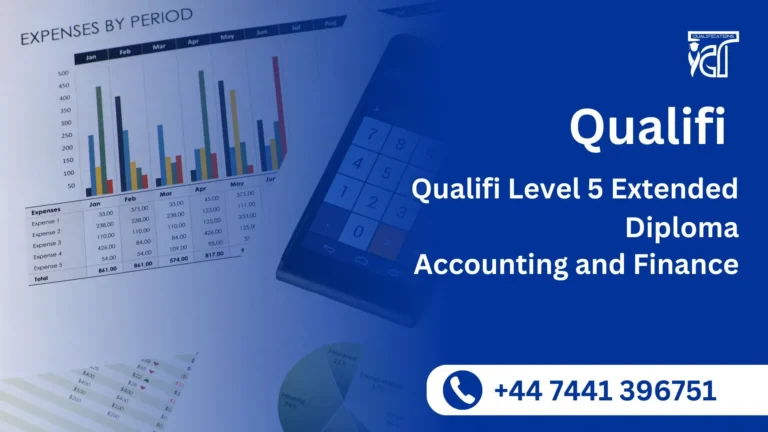Data science is a rapidly expanding field, driving decision-making across industries. The Qualifi Level 3 Diploma in Data Science provides learners with the fundamental knowledge and analytical skills needed to enter this dynamic sector. Designed to offer a strong foundation, this qualification is ideal for those aspiring to work in data-related roles or progress to higher studies.
As an Ofqual-regulated awarding body, Qualifi ensures that its qualifications meet high academic and industry standards. This diploma is delivered through assignment-based assessment, eliminating the need for exams. Learners benefit from a structured approach to understanding key concepts while developing essential problem-solving abilities.
This qualification follows an assignment-based assessment method, allowing learners to apply theoretical knowledge to real-world scenarios. The approach fosters independent research, critical thinking, and analytical skills essential for a career in data science.
Upon completion, learners can explore various pathways, including further study at Level 4 or entry-level roles in data analysis, business intelligence, and IT-related fields. The demand for skilled data professionals continues to grow, and this diploma provides the perfect stepping stone for those looking to enter the industry. Whether you are starting your career or upskilling, this qualification equips you with the knowledge and skills needed for success.
The Qualifi Level 3 Diploma in Data Science qualification consists of 15 mandatory units for Credit Equivalency 60 for the completed qualification.
| Sr# | Unit Title | Credits | GLH |
| 1 | The Field of Data Science | 6 | 45 |
| 2 | Python for Data Science | 9 | 68 |
| 3 | Creating and Interpreting | 3 | 23 |
| 4 | Visualisations in Data Science | 6 | 45 |
| 5 | Data and Descriptive Statistics in Data Science | 3 | 23 |
| 6 | Fundamentals of Data Analytics | 3 | 23 |
| 7 | Data Analytics with Python | 3 | 23 |
| 8 | Machine Learning Methods and Models in Data Science | 3 | 23 |
| 9 | The Machine Learning Process | 3 | 23 |
| 10 | Linear Regression in Data Science | 3 | 23 |
| 11 | Logistic Regression in Data Science | 3 | 23 |
| 12 | Decision Trees in Data Science | 3 | 23 |
| 13 | K-means Clustering in Data Science | 3 | 23 |
| 14 | Synthetic Data for Privacy and Security in Data Science | 6 | 45 |
| 15 | Graphs and Graph Data Science | 6 | 45 |
GLH (Guided Learning Hours) and TQT (Total Qualification Time) are terms commonly used in vocational qualifications to help define the amount of time a learner is expected to spend on their studies.
1. GLH (Guided Learning Hours)
GLH refers to the number of hours a learner spends being directly taught, supervised, or supported during their course. This includes the time spent in activities such as:
- Classroom instruction
- Practical workshops
- One-on-one tutoring or mentoring sessions
- Online learning sessions with tutor support
In other words, GLH represents the time that learners are actively engaged with their instructors or learning activities.
2. TQT (Total Qualification Time)
TQT represents the total amount of time a learner is expected to invest in completing a qualification, including:
- GLH (Guided Learning Hours): Time spent on direct learning, as explained above.
- Self-Directed Learning: This includes time spent on independent study, research, assignment completion, preparation for exams, and any other work the learner does outside of direct teaching hours.
TQT is a broader measure that includes all the time required to achieve the qualification. It helps learners and employers understand the overall commitment required for the qualification.
Key Differences Between GLH and TQT:
- GLH focuses on direct learning with guidance or supervision.
- TQT includes GLH as well as independent study time and other learning-related activities.
Example:
If a qualification has a TQT of 600 hours and a GLH of 250 hours, it means the learner should spend 250 hours in direct learning (classroom, online, or tutor-led sessions) and 350 hours on independent study or research.
Learning Outcomes of Qualifi Level 3 Diploma in Data Science
The Field of Data Science
- Understand the core issues of data science.
- Understand the core issues of data and big data
- Understand the core issues of artificial intelligence.
- Understand the core issues of machine learning.
- Understand the core issues of deep learning.
Python for Data Science
- Understand the design philosophy and features of Python.
- Understand Python’s basic data types.
- Be able to create and manipulate lists and tuples.
- Be able to create and manipulate sets and dictionaries.
- Be able to write Python functions and flow statements.
Creating and Interpreting Visualisations in data science
- Understand the role and importance of visualising data.
- Understand basic plots and charts.
- Be able to create and interpret plots and charts.
Data and Descriptive Statistics in Data Science
- Understand the different types of data and their characteristics.
- Understand measures of centre.
- Understand measures of spread
- Understand measures of symmetry and peakness.
- Understand measures of joint variability and linear relation.
Fundamentals of Data Analytics
- Understand the processes and types of data analytics.
- Understand the data analytics ecosystem.
- Understand the issues and methods for dealing with data quality issues.
- Understand the issues and methods of basic data transformations.
Data Analysis with Python
- Be able to load and save data
- Be able to perform basic data wrangling and exploratory analysis.
- Be able to perform basic data cleaning tasks.
- Be able to perform basic data transformation tasks
Machine Learning Methods and Models in Data Science
- Understand the concepts of basic supervised machine learning models
- Understand the concepts of basic unsupervised machine learning models
- Understand the concepts of basic reinforcement learning.
The Machine Learning Process
- Understand the machine learning process.
- Understand the data preparation process for machine learning models.
- Understand how to evaluate machine learning models.
- Be able to evaluate classification models.
- Understand the issues of bias and variance in models.
Linear Regression in Data Science
- Understand the basic theory of linear regression.
- Understand regression metrics and how to evaluate a regression model.
- Be able to perform regression calculations and analysis.
- Be able to create linear regression models
Logistic Regression in Data Science
- Understand the basic theory of logistic regression.
- Be able to perform logistic regression calculations.
- Be able to create logistic regression models.
Decision Trees in Data Science
- Understand what a decision tree is in data science
- Understand how to construct a decision tree in data science.
- Be able to perform calculations using decision tree metrics in data science.
- Be able to build a decision tree model in data science.
k-means Clustering in Data Science
- Understand the theory of k-means clustering.
- Understand how to evaluate k-means clusters
- Be able to create and evaluate a k-means model.
Synthetic Data for Privacy and Security in Data Science
- Understand the core issues of data privacy and security.
- Understand the basics of differential privacy.
- Understand the core issues of synthetic data.
- Understand the synthetic data ecosystem.
- Be able to create anonymised or fake data.
Graphs and Graph Data Science
- Understand different types of graphs and their properties
- Understand the core types of graph data models.
- Understand the graph ecosystem.
- Understand the types of graph data science and graph algorithms.
Course Benefits of the Qualifi Level 3 Diploma in Data Science
The Qualifi Level 3 Diploma in Data Science offers several advantages for learners looking to develop a solid foundation in the rapidly growing field of data science. With a focus on practical knowledge, the course ensures that learners are well-equipped to tackle data-driven challenges in various industries.
- Comprehensive Understanding of Data Science
- Gain a strong foundation in data science principles, analytics, and statistical methods
- Develop key skills in data processing, database management, and machine learning
- Assignment-Based Assessment
- Learn through assignments that promote critical thinking and problem-solving
- No exams, enabling a deeper understanding of the subject matter
- Industry-Relevant Skills
- Acquire practical skills that are highly valued by employers across industries
- Learn programming languages and tools commonly used in the data science field
- Flexible Learning Approach
- Study at your own pace with access to a wide range of resources
- Tailored learning materials and support to suit different learning styles
- Improved Career Opportunities
- Open doors to entry-level roles in data analysis, business intelligence, and IT
- Enhance employability by acquiring skills relevant to the growing data-driven economy
Ideal Learner for the Qualifi Level 3 Diploma in Data Science
The Qualifi Level 3 Diploma in Data Science is designed for individuals eager to embark on a career in data science or enhance their existing skills in data analytics. The qualification provides a structured approach to learning while allowing flexibility to suit learners from various backgrounds.
Who Should Enrol?
This course is ideal for:
- Aspiring Data Professionals
- Individuals seeking to begin a career in data science or analytics
- Those looking to develop a strong foundational knowledge of data processing, statistical methods, and programming
- Professionals Seeking to Upskill
- People currently in IT, business, or related fields who want to acquire data science skills to broaden their career opportunities
- Students Interested in Further Education
- Learners planning to progress to higher-level qualifications in data science, computer science, or business intelligence
- Those with a Strong Interest in Technology and Problem Solving
- People passionate about using data to solve real-world problems and drive business decisions
- Individuals who enjoy analytical thinking, programming, and working with complex datasets
Entry Requirements
Register Now
Qualification Process
Qualification Process for the Qualifi Level 3 Diploma in Data Science
- Self-Assessment:
Begin by evaluating your eligibility to ensure you meet the qualification requirements, including work experience, knowledge, and language proficiency. - Registration:
Complete your registration by submitting the required documents, including a scanned copy of a valid ID, and paying the registration fee. - Induction:
An assessor will conduct an induction to confirm your eligibility for the course and explain the evidence requirements. If you do not meet the criteria, your registration will be canceled, and the fee will be refunded. - Assignments & Evidence Submission:
Provide all assignments and the necessary evidence based on the assessment criteria outlined in the course. If you are unsure of the required evidence, consult with the assessor for guidance on the type and nature of evidence needed. - Feedback and Revision:
The assessor will review your submitted evidence and provide feedback. Evidence that meets the criteria will be marked as “Criteria Met,” while any gaps will be identified. You will be asked to revise and resubmit if needed. - Competence Evidence:
Submit final evidence demonstrating that all learning outcomes have been met. This evidence will be marked as “Criteria Met” by the assessor once it is satisfactory. - Internal Quality Assurance (IQA):
The Internal Quality Assurance Verifier (IQA) will review your evidence to ensure consistency, quality, and compliance with standards. - External Verification:
The IQA will submit your portfolio to Qualifi’s External Quality Assurance Verifiers (EQA) for final confirmation. The EQA may contact you directly to verify the authenticity of your evidence. - Certification:
Upon successful completion of all checks, Qualifi will issue your official certificate, confirming that you have attained the Qualifi Level 3 Diploma in Data Science.







